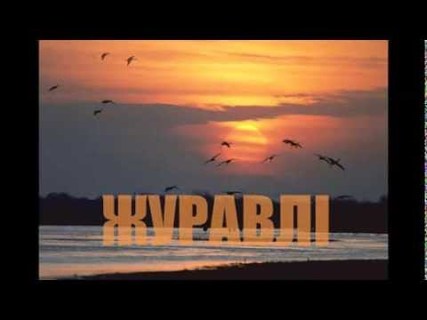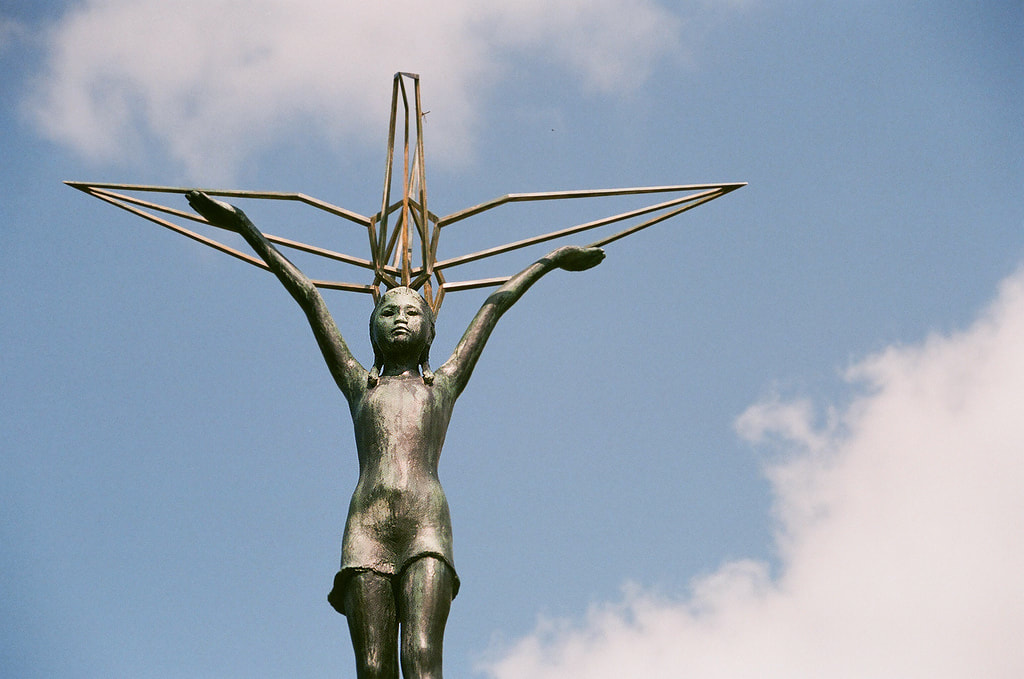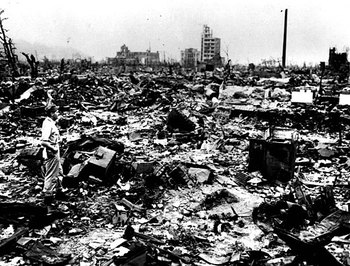Zhuravli (White Cranes)
|
The song Zhuravli was composed in 1968 by the popular Russian composer and performer Yan Abramovich Frenkel, and became one of the most popular Russian songs about World War II.
The origin for the song has become a poem written by the Dagestan poet Rasul Gamzatov. After he had visited Hiroshima and the Hiroshima Peace Memorial Park, he was impressed by the story of the Japanese girl Sadako Sasaki, whom a monument in the park was dedicated to. At the moment that the US atomic bomb "Little Boy" had been dropped on Hiroshima, Sadako Sasaki was only two years old. By the explosion, that took place nearby her house, she had been blown out of the window, but as her mother did find the girl back alive, she thought that nothing was wrong. About ten years later Sadako developed swellings in her neck, thereafter purple spots appeared on her legs: she was diagnosed with leukemia, caused by the radiaton exposure. |
|
On August 1955, Sadako Sasaki's best friend Shizuko came to the hospital and cut a gold piece of paper into a square, to fold it into a paper crane. The crane was a sacred bird in Japan and the girl explained that an ancient Japanese story promises that if a sick person folds a thousand origami cranes, he soon will get well. Sadako started folding, in the hope to get better and she didn't stop, even when she felt very sick. She died on October 25 1955 at the age of 12, having folded only 644 paper cranes. Her friends completed the thousand cranes and buried them with her. (After the book "Sadako and the 1000 paper cranes").
This story haunted Rasul Gamzatov for months and it inspired him to write a poem. Originaly it was written in Avar language, but soon the Russian translation was made by the Russian poet Naum Grebnyov. |
The monument dedicated to Sadako Sasaki
|
|
Hiroshima after the atomic bomb
|
The poem was published in the journal Novy Mir and caught the attention of the famous Soviet actor and singer Mark Naumovich Bernes, who revised the lyrics and urged Yan Frenkel to write a music to it.
When Frenkel first played his new song, Mark Bernes, who suffered from cancer, cried as he felt as if this song was about his own faith. The song premiered in 1969 and it became one of the best known Russian-language songs all over the world. Only one week after the recording Bernes died; the song was played at his funeral. Afterwards "White cranes" came into association with an image of murdered soldiers and some corresponding memorials in the former Soviet Union featuring the image of flying cranes. On some memorials even several lines of the song are added. |
|
|
|
Sources: http://en.wikipedia.org/wiki/Zhuravli; http://en.wikipedia.org/wiki/Sadako_Sasaki
http://lyricstranslate.com/en/zhuravli-zhuravli-cranes.html; http://www.hiroshima-is.ac.jp/index.php?page=sadako-story
http://ruslovo.blogspot.be/2011/05/zhuravli-song.html
http://lyricstranslate.com/en/zhuravli-zhuravli-cranes.html; http://www.hiroshima-is.ac.jp/index.php?page=sadako-story
http://ruslovo.blogspot.be/2011/05/zhuravli-song.html
|
Russian lyrics
Журавли Мне кажется порою, что солдаты С кровавых не пришедшие полей, Не в землю нашу полегли когда-то, А превратились в белых журавлей. Они до сей поры с времен тех дальних Летят и подают нам голоса. Не потому ль так часто и печально Мы замолкаем глядя в небеса? Летит, летит по небу клин усталый, Летит в тумане на исходе дня. И в том строю есть промежуток малый - Быть может это место для меня. Настанет день и журавлиной стаей Я поплыву в такой же сизой мгле. Из-под небес по-птичьи окликая Всех вас, кого оставил на земле. Мне кажется порою, что солдаты С кровавых не пришедшие полей, Не в землю нашу полегли когда-то, А превратились в белых журавлей. |
English lyrics
White Cranes Sometimes it seems to me that the soldiers, Which haven't returned from blood's fields, Haven't layed in our land, But have turned into white cranes. From those distant times They fly and we hear their voices. Is it because so often and so sadly We are falling silent and looking into heaven? The tired crane flock flies, flies through the sky, Flies in the mist at the end of the day. And it is a small gap in this order - Perhaps this place is for me. The day will come, and in such crane flock I'll swim in the same blue-gray haze. Calling out like a bird from the heavens All of you who are left on earth. Sometimes it seems to me that the soldiers, Which haven't returned from blood's fields, Haven't layed in our land, But have turned into white cranes. |



